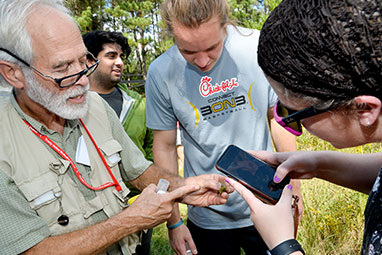SPARTANBURG, S.C. — Their lab is the world.
Once each week, Dr. Doug Rayner, professor of biology, and Dr. Katie Putney, assistant professor of biology, take the Wofford College students in their field biology class beyond the walls of the Milliken Science Center into the mountains, woods and fields of the area.
They "catch and release critters" to practice the identification skills they're learning in the classroom.
Nathan Fechheimer, a junior biology and computer science major from Athens, Ga,, took the class because he wants to become a research biologist.
"I've studied a lot of micro biology," he says, "so I wanted to try a different area before I commit to that emphasis in graduate school."
As the students discover something new, Rayner and Putney ask questions, steering the students toward critical thinking and the “aha” moments of correct identification.
"You realize there's a reason for everything," says Fechheimer, who has enjoyed seeing familiar plants and creatures in a new way thanks to the experience. "No evolution is stupid. It's like Dr. Rayner says, 'if it was, it wouldn't exist.'"
Field biology at Wofford is an introduction to the identification and natural history of arthropods, animals and selected non-vascular plants. While in the field this fall, Wofford students have seen and studied snakes; birds, including a bald eagle; frogs; butterflies and moths; a variety of spiders; the difference between golden rod and ragweed; skinks and a variety of other native plants and animals.
Practicing species identification
Field biology students find the familiar and the unexpected during lab